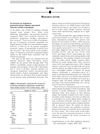 1 citations,
July 2021 in “Journal of The American Academy of Dermatology”
1 citations,
July 2021 in “Journal of The American Academy of Dermatology” Face mask-related injuries in U.S. emergency departments rose by 2400% during the COVID-19 pandemic, with most injuries being dermatitis and lacerations.
 36 citations,
November 2020 in “Journal of The European Academy of Dermatology and Venereology”
36 citations,
November 2020 in “Journal of The European Academy of Dermatology and Venereology” 5-alpha-reductase inhibitors may reduce COVID-19 symptoms in bald males.
6 citations,
December 2022 in “Journal of Infection” The ACE1 gene variant doesn't affect long-COVID symptoms.
 71 citations,
April 2020 in “Journal of Cosmetic Dermatology”
71 citations,
April 2020 in “Journal of Cosmetic Dermatology” Genetic differences may affect COVID-19 deaths; anti-androgens could be potential treatment.
 January 2021 in “Journal of The European Academy of Dermatology and Venereology”
January 2021 in “Journal of The European Academy of Dermatology and Venereology” Men with hair loss who take a certain type of medication may experience fewer COVID-19 symptoms.
 21 citations,
January 2021 in “Journal of infection and chemotherapy”
21 citations,
January 2021 in “Journal of infection and chemotherapy” Men, diabetes, and high inflammation levels lead to higher COVID-19 antibodies.
 February 2024 in “Psychoneuroendocrinology”
February 2024 in “Psychoneuroendocrinology” Mothers with lower stress during pregnancy but higher stress after birth had infants with lower development scores.
 May 2023 in “Dermatology Reports”
May 2023 in “Dermatology Reports” The study found that skin conditions in COVID-19 patients can signal serious internal organ damage and may be life-threatening.

Icosapent ethyl may help treat long-lasting symptoms after COVID-19.
 56 citations,
May 2021 in “Journal of infection/The Journal of infection”
56 citations,
May 2021 in “Journal of infection/The Journal of infection” Most hospitalized COVID-19 patients had long-term symptoms like fatigue and hair loss, with women and those sicker during hospitalization at higher risk.
 April 2023 in “American Journal of Transplantation”
April 2023 in “American Journal of Transplantation” Hormone replacement therapy may lower the risk of severe COVID-19 outcomes in non-immunosuppressed people and male organ transplant recipients.
 68 citations,
May 2021 in “Endocrine”
68 citations,
May 2021 in “Endocrine” People with diabetes or obesity should manage their conditions carefully as they have a higher risk of severe COVID-19.
 9 citations,
November 2021 in “Infectious Agents and Cancer”
9 citations,
November 2021 in “Infectious Agents and Cancer” Androgen deprivation therapy doesn't lower the risk of death from COVID-19 in prostate cancer patients.
 6 citations,
September 2020 in “Journal of The American Academy of Dermatology”
6 citations,
September 2020 in “Journal of The American Academy of Dermatology” Severe male balding may increase the risk of serious COVID-19, and treatments that reduce androgens or block a specific enzyme might help protect these individuals.
 6 citations,
July 2020 in “Journal of The American Academy of Dermatology”
6 citations,
July 2020 in “Journal of The American Academy of Dermatology” Hair loss link to severe COVID-19 unclear.
 2 citations,
August 2020 in “Journal of The American Academy of Dermatology”
2 citations,
August 2020 in “Journal of The American Academy of Dermatology” High incidence of hair loss found in COVID-19 patients, but no severity correlation established.
 January 2023 in “Journal of men's health”
January 2023 in “Journal of men's health” Higher dihydrotestosterone may be linked to more inflammation in COVID-19 patients with low testosterone.
 November 2020 in “Journal of Bioengineering and Technology Apllied for Health”
November 2020 in “Journal of Bioengineering and Technology Apllied for Health” COVID-19 affects multiple body systems and complicates treatment; accurate testing is crucial.
 7 citations,
July 2020 in “Journal of The American Academy of Dermatology”
7 citations,
July 2020 in “Journal of The American Academy of Dermatology” Skin symptoms linked to COVID-19 are hard to confirm, and more testing is needed to identify which are truly caused by the virus.
 8 citations,
May 2021 in “Journal of the European Academy of Dermatology and Venereology”
8 citations,
May 2021 in “Journal of the European Academy of Dermatology and Venereology” A COVID-19 patient had unusual nail discoloration and nail separation possibly due to the virus's effects on small blood vessels.
 December 2020 in “Dermatology archives”
December 2020 in “Dermatology archives” Some COVID-19 pneumonia patients in Veracruz, Mexico, had skin issues, with reversible hair loss linked to disease severity.
 9 citations,
January 2020 in “Critical Reviews in Immunology”
9 citations,
January 2020 in “Critical Reviews in Immunology” MAIT cells may help fight COVID-19 but also contribute to severe inflammation.
 November 2021 in “Open Forum Infectious Diseases”
November 2021 in “Open Forum Infectious Diseases” Some COVID-19 pneumonia patients in Veracruz, Mexico had rare skin issues like temporary hair loss linked to disease severity.
 121 citations,
November 2020 in “Endocrine”
121 citations,
November 2020 in “Endocrine” Male hormones like testosterone may make COVID-19 worse, and testing for sensitivity to these hormones could help predict how severe a patient's symptoms might be. Treatments that reduce these hormones are being explored.
 1 citations,
September 2020 in “Journal of the Endocrine Society”
1 citations,
September 2020 in “Journal of the Endocrine Society” Men have worse COVID-19 outcomes than women due to genetic and hormonal differences.
 November 2021 in “Research Square (Research Square)”
November 2021 in “Research Square (Research Square)” The research found that COVID-19 survivors experienced long-term effects like anemia and hypertension, with age and gender being important factors, but race, income, and education had little to no impact.
January 2021 in “International Journal of Research in Medical Sciences” During the COVID-19 lockdown, there were fewer cases of mild skin issues and more cases of stress-related skin conditions.
 26 citations,
September 2020 in “Journal of the European Academy of Dermatology and Venereology”
26 citations,
September 2020 in “Journal of the European Academy of Dermatology and Venereology” A certain genetic variant in the androgen receptor may predict the severity of COVID-19 in men.
 1 citations,
March 2021 in “The Journal of Sexual Medicine”
1 citations,
March 2021 in “The Journal of Sexual Medicine” The letter suggests testosterone replacement therapy might worsen COVID-19 outcomes.
 March 2022 in “medRxiv (Cold Spring Harbor Laboratory)”
March 2022 in “medRxiv (Cold Spring Harbor Laboratory)” People with blood group O may have a higher risk of developing post-COVID-19 syndrome.



























